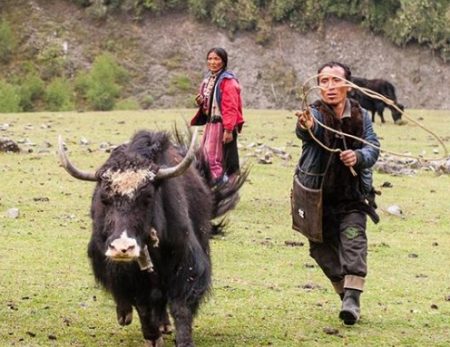October 26, 2018 – Sometimes studying climate change means starting up a conversation with locals to understand how the environment is changing. That’s exactly what two researchers recently have done in the mountainous country of Bhutan. A sampling of one hundred elder herders received a questionnaire where they were asked to comment on weather pattern observations, changes to vegetation in their localities, and impacts on herding practices.
The majority of survey participants knew about global warming. Did that influence their answers? Considering the detailed questions asked, knowledge of global warming was not seen as a potential source of bias in assembling the results.
Local observation is a vital source of new knowledge to be added to measurable evidence gathered from a wide range of instrumented, scientific studies. Weighting yak herder perceptions, keen observers of local conditions, is an important addition to the body of climate change science.
A little bit of background on yak farming in Bhutan. Conducted in remote areas and rugged terrain in the northern part of the country, the herders in this survey were chosen from five small villages where average annual temperatures range from 20 Celsius to -10 Celsius. The total number of survey participants was 100. The basis for their answers was a comparison of the current climate with what they remembered from 15 years ago.
The vast majority noted that temperatures have risen and that weather patterns have changed for the worse. The majority noted that snow and glaciers are melting faster, and that water sources were drying gradually. Since the herders moved their yaks to different pasturages throughout the year, the majority noted that the timing of migrations was changing as warming altered precipitation patterns. When asked if they were adapting to warming and changing climate, the majority stated that they had not as of yet.
What is interesting about these shared perceptions from local herders, is how it syncs with what gathered data from scientific instrumentation shows. Grasslands are shrinking as invasive species move into meadowlands, and the tree line is climbing higher as temperatures warm. Bhutan has reported a 22% decline in alpine grazing areas since 1998. Yak herders concur.
But not all climate change impacts are seen as negative. The increased vegetation growth in higher elevations means fewer incidents of soil erosion and potentially better soil water retention. This may translate into increased opportunities for small-scale hydroelectric energy production from the many mountain streams found in Bhutan.
Only one observation doesn’t jive with scientific data collected. It concerns freshwater availability. The herders describe a growing decline in water resources pointing to increased frequency of droughts. This observation conforms with Bhutan’s Gross National Happiness Commission report from 2011. But data also shows an increase in glacial and snowmelt which would suggest increased freshwater availability. The contradiction may relate to seasonal observation variability which impacts herders when seeking freshwater for their animals.
The researchers in their conclusion note that as an adaptation strategy the herders face an uncertain future with declining herd size likely and, therefore, falling incomes. This means they will inevitably seek alternative economic opportunities if they wish to sustain their families and their way of life. That step has yet to be taken.
A final note of why this survey of 100 yak herders is relevant. Any change to the climate of the Himalayas region has consequences for the downstream nations of China, Southeast Asia, and the Indian subcontinent. The Himalayas are the primary water source for the rivers that flow through all of these countries. And as the snow and ice fields retreat, all of these important rivers are being negatively impacted.
















